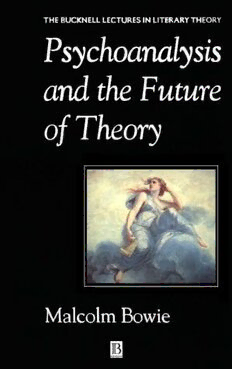
Psychoanalysis and the Future of Theory (Bucknell Lectures in Literary Theory) PDF
174 Pages·1993·3.847 MB·English
Most books are stored in the elastic cloud where traffic is expensive. For this reason, we have a limit on daily download.
Preview Psychoanalysis and the Future of Theory (Bucknell Lectures in Literary Theory)
Description:
Malcolm Bowie is already well known as a writer who has made "theory" and "criticism" intelligible to each other in new ways. In this new collection he examines the meanings that psychoanalysis has ascribed to the tense and the devices by which later Lacan completes and complexifies Freud's discussions of temporality. "What kind of future can psychoanalysis have when it talks about futurity in this fashion?" In answering this question Malcolm Bowie focuses on an exemplary moment of crisis in the history of psychoanalytic thought. He challenges some of the fundamental Freudian assumptions about temporality of discourse and draws attention to a whole new range of opportunities that a "future-conscious" psychoanalysis might offer critics and theorists of other intellectual persuasions.Bowie calls for a new openness towards art among psychoanalytic theorists, drawing his examples from a wide variety of artistic practices. Musicians (Mozart, Mahler, Schoenberg and Faur?), visual artists (Michelangelo, Leonardo, Tiepolo and Matisse) and writers (Goethe, Proust and Svevo) are all placed in an illuminating two-way relationship with the writings of Freud.
See more
The list of books you might like
Most books are stored in the elastic cloud where traffic is expensive. For this reason, we have a limit on daily download.
